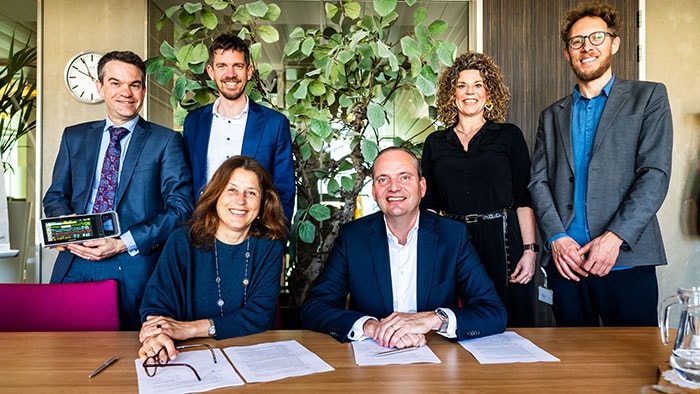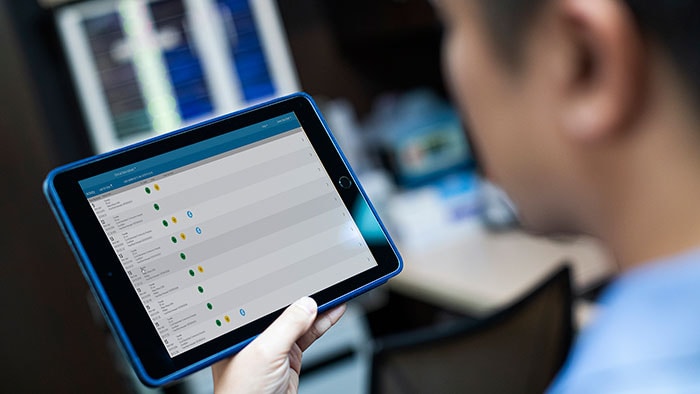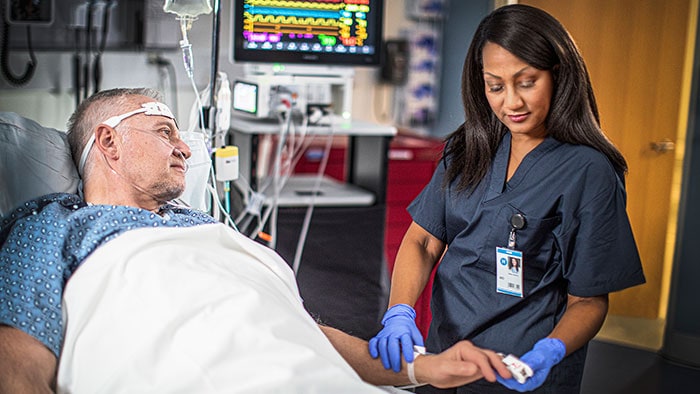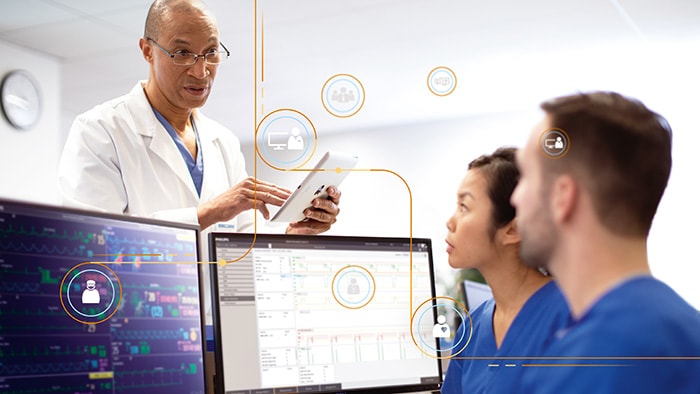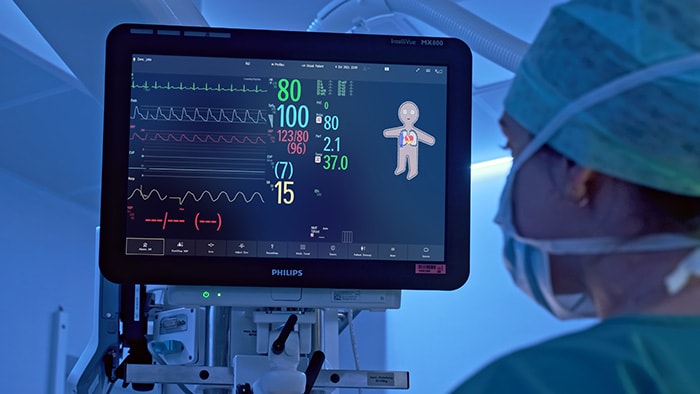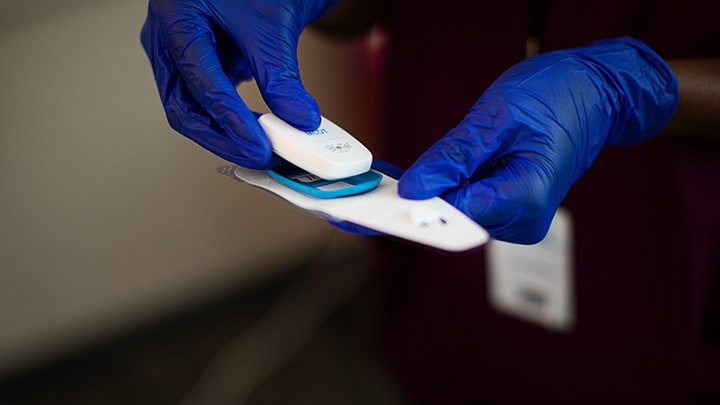Signalen en systemen hebben eigenlijk altijd centraal gestaan in de carrière van Mohammed Meftah. Hij leerde de kneepjes van het vak bij de research-afdeling die zich bezighield met de opvolger van DVD. Inmiddels is hij hard op weg om met baanbrekend onderzoek de levens van ongeboren, en te vroeg geboren, baby’s te verbeteren.
Hoe begon je carrière bij Philips?
“Ik begon in 2001 in een team dat werkte aan de Blu-ray, de beoogde opvolger van de DVD. Daarna zijn we onder meer onderzoek gaan doen naar dataopslag via hologrammen. Deze techniek bood de mogelijkheid om met een hoge snelheid veel meer data op te slaan dan op platte optische schijven. In 2005, maakte ik de stap naar medische technologie.”
Was dat een groot verschil?
“Er is meer overeenkomst tussen het lezen van data uit discs en uit het menselijk lichaam dan je misschien zou denken. Het belangrijkste verschil is dat het menselijk lichaam veel complexer is dan een optische schijf die we zelf kunnen ontwerpen om data optimaal uit te kunnen lezen. Dat maakt het medische onderzoeksveld uitdagend en boeiend, vanwege de grotere maatschappelijke impact.”
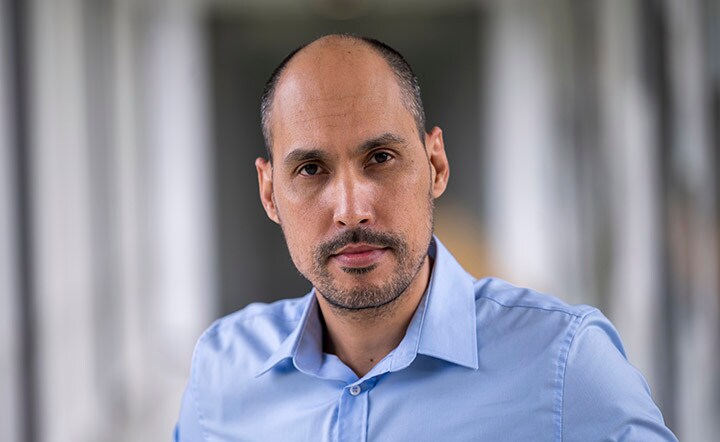
Aan wat voor technologieën werk je zoal?
“Mijn expertise ligt op het gebied van contactloos monitoren van patiënten. Denk aan slimme sensoren waarmee je elektrocardiogrammen kunt meten en cameratechnologie voor het bewaken van vitale functies zoals ademhaling, hartslag en zuurstofsaturatie. Met deze innovaties kunnen we patiënten op een comfortabele en betrouwbare manier monitoren, zonder dat je iets op de huid hoeft te plakken.”
Wat kun je daar zoal mee?
“Bij te vroeg geboren baby’s worden nu nog sensoren op de huid geplakt om ze te monitoren. De huid is een belangrijk orgaan, en het plakken van sensoren op de huid kan bij baby’s stress en pijn opleveren. Het zou natuurlijk geweldig zijn als we daar een beter alternatief voor kunnen ontwikkelen, bijvoorbeeld speciale sensoren in het couveusematrasje en camera’s op de couveuse om contactloos te monitoren.
De grootste uitdaging hierbij zijn de bewegingen die een baby maakt, maar ook verstoringen van de signalen door de verzorging van ouders en verpleegkundigen. Het is de uitdaging om ondanks deze verstoringen de vitale functies toch nauwkeurig te kunnen registreren en verwerken zodat de verpleegkundige of neonatoloog het juiste klinische besluit kan nemen.”
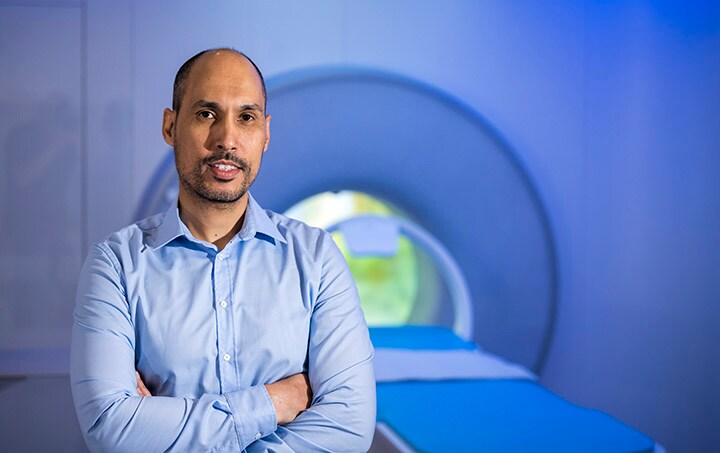
In welke oplossingen van Philips kunnen we jouw uitvindingen terugvinden?
“Onze uitvindingen en inzichten op het gebied van contactloos monitoren worden toegepast in een scala van toepassingen, zoals in MRI-scanners; met VitalEye kunnen verstoringen die worden veroorzaakt door ademhaling automatisch worden gecorrigeerd. Dankzij VitalEye kunnen we betere MRI-beelden maken waarbij de patiënt minder lang in de scanner hoeft te liggen. Dit is prettiger voor de patiënt en bespaart daarnaast kosten voor het ziekenhuis.”
“Dat is het mooie van werken bij Philips. Terwijl je werkt aan je hoofdonderzoeksproject ontdek je nieuwe toepassingen voor je technologie. Er ontstaat als het ware een soort platform dat, met wat kleine aanpassingen, voor verschillende doeleinden ingezet kan worden.”
“Wij hebben als eerste in de wereld aangetoond dat het meten van zuurstofsaturatie met een camera, onder verschillende praktijkomstandigheden, mogelijk is. Naast mooie publicaties heeft dit ook een aantal belangrijke patenten opgeleverd.”
“Wij hebben als eerste in de wereld aangetoond dat het meten van zuurstofsaturatie met een camera, onder verschillende praktijkomstandigheden, mogelijk is. Naast mooie publicaties heeft dit ook een aantal belangrijke patenten opgeleverd.”
Mohammed Meftah
Senior Scientist
Waar werk je op dit moment aan?
“We kijken nu naar de mogelijkheden van foetale bewaking, ofwel het monitoren van het ongeboren kind maar dan vanuit thuis. Vrouwen met een gecompliceerde zwangerschap, zoals zwangerschapsdiabetes of een te hoge bloeddruk, moeten vanwege een verhoogd risico vaak naar het ziekenhuis voor controles. Het is natuurlijk niet prettig om een paar keer per week naar het ziekenhuis te moeten voor een meting van een halfuurtje, dat kan zelfs een hoop stress met zich meebrengen.
Hoe mooi zou het niet zijn als zwangere vrouwen in hun vertrouwde thuisomgeving zelf metingen kunnen verrichten, op een gebruiksvriendelijke en toch betrouwbare manier? De gynaecoloog kan dan vanuit het ziekenhuis de data beoordelen, diagnoses stellen en eventueel interventies in gang zetten.
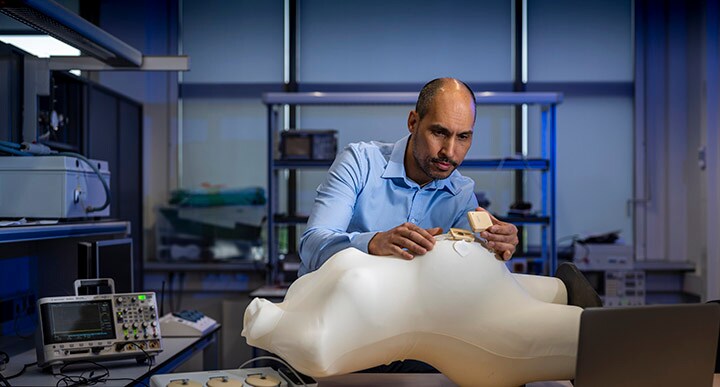
Voor je werk ontving je onlangs een Invention Award; een erkenning voor het behalen van de mijlpaal van tien patenten. Wat betekende dat voor je?
“Dat is natuurlijk een eer, want het patenteren van nieuwe technologie is erg belangrijk voor Philips. Maar misschien haal ik nog wel de meeste voldoening uit het doorlopen van het gehele innovatietraject. Dat begint met het helder krijgen van de behoefte van de eindgebruiker, de patiënt, verpleegkundige of arts. We praten veel met ze om de praktijk beter te begrijpen en oplossingen te bedenken voor hun uitdagingen, in co-creatie.
“Misschien haal ik wel de meeste voldoening uit het doorlopen van het gehele innovatietraject. Dat begint met het helder krijgen van de behoefte van de eindgebruiker, de patiënt, verpleegkundige of arts. We praten veel met ze om de praktijk beter te begrijpen en oplossingen te bedenken voor hun uitdagingen, in co-creatie.”
Mohammed Meftah
Senior Scientist
We zijn eigenlijk op zoek naar de meest relevante problemen, om vervolgens daar een oplossing voor te bedenken. En als die oplossing nieuw is en niet voor de hand liggend is, heb je in feite een uitvinding te pakken. Dat hele traject maakt mijn werk geweldig; dat je ziet dat iets wat wij bedacht hebben daadwerkelijk het verschil kan gaan uitmaken in het leven van een arts of een patiënt.”
Binnen Philips werken elke dag duizenden uitvinders aan de technologieën van morgen. Wat drijft hen? Hoe komen ze op hun ideeën en hoe brengen ze die met succes op de markt? In de serie Impactful Inventors geven we antwoord op deze vragen.
Lees ook:
Henk van Houten, Chief Technology Officer: “Winnaars Invention Awards zijn de helden van Philips Research”
Mark Johnson, de man van honderden patenten: “Er is geen opleiding tot uitvinder”
“We waren het enige Europese team dat een presentatie mocht geven op een AI-evenement in het Witte Huis”: het is de missie van Anca Bucur om data en kunstmatige intelligentie om te zetten van een belofte naar een daadwerkelijk klinisch voordeel.
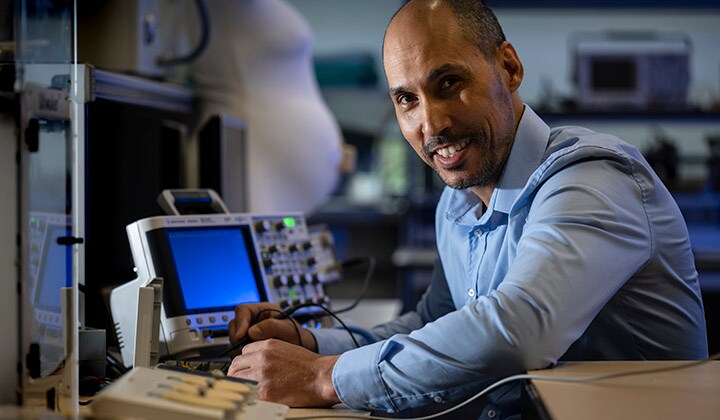
'Inventing is looking for relevant problems and finding new solutions to them that are not obvious'
Signals and systems have always been central to Mohammed Meftah's career. He learned the ropes at the research department that worked on the successor to DVD. Now he works hard on improving the lives of unborn and prematurely born babies with pioneering research.
How did your career begin at Philips?
"I started in 2001 on a team working on Blu-ray, the intended successor to the DVD. After that, one of the things we started doing was researching data storage via holograms. This technology offered the possibility of storing much more data at high speed in comparison to flat optical disks. In 2005, I made the move to medical technology."
Was that a big difference?
"There is more similarity between reading data from discs and from the human body than you might think. The main difference is that the human body is much more complex than an optical disc that we can design ourselves to read data optimally. That makes the medical research field challenging and fascinating, because of its greater social impact."

What kinds of technologies are you working on?
"My expertise lies in the field of contactless monitoring of patients. Think of smart sensors that allow you to measure electrocardiograms and camera technology for monitoring vital signs such as breathing, heart rate and oxygen saturation. With these innovations, we can monitor patients in a comfortable and reliable way, without having to stick anything on the skin."
What can you do with that?
"In premature babies, sensors are currently attached to the skin to monitor them. The skin is an important organ, and sticking sensors on the skin can cause stress and pain in babies. It would of course be great if we could develop a better alternative for this, for example special sensors in the incubator mattress and cameras on the incubator for contactless monitoring.
The biggest challenge in acquiring reliable signals is that they are affected by movements that a baby makes, and also disruptions to the signals arising from care-related handling by parents and nurses. The challenge is to be able to accurately record and process vital signs despite these disruptions so that the nurse or neonatologist can make the correct clinical decision."

In which Philips solutions can we find your inventions?
"Our inventions and insights in the field of non-contact monitoring are used in a range of applications, such as in MRI scanners; with VitalEye, distortions caused by breathing can be corrected automatically. Thanks to VitalEye, we can make better MRI images, with the patient having to spend less time in the scanner. This is more pleasant for the patient and saves costs for the hospital."
"That's the beauty of working at Philips. While working on your main research project you discover new applications for your technology. A kind of platform emerges, as it were, that, with some minor adjustments, can be used for different purposes."
"We were the first in the world to demonstrate that measuring oxygen saturation with a camera, under different practical conditions, is possible. In addition to great publications, this has also resulted in a number of important patents."
“We were the first in the world to demonstrate that measuring oxygen saturation with a camera, under different practical conditions, is possible. In addition to great publications, this has also resulted in a number of important patents.”
Mohammed Meftah
Senior Scientist
What are you currently working on?
"We are now looking at the possibilities of fetal monitoring, or monitoring the unborn child but from home. Women with complicated pregnancies, such as gestational diabetes or hypertension, often have to visit the hospital for routine checkups because of increased risk in their pregnancy. Of course, it is not pleasant to visit the hospital several times a week for a half-hour measurement, it can even cause a lot of stress.
Wouldn't it be nice if pregnant women could take measurements themselves in their familiar home environment, in a user-friendly yet reliable manner?” The OBGYN physician can then assess the data remotely from the hospital, make diagnoses and possibly initiate interventions.

For your work, you recently received an Invention Award; a recognition for reaching the milestone of ten patents. What did that mean to you?
"That is of course an honor, because patenting new technology is very important for Philips. But perhaps I get the most satisfaction from going through the entire innovation process. It starts by clarifying the needs of the end user, the patient and health care professional. We talk to them a lot to better understand their practice and come up with solutions for their challenges, in a co-creation framework.
“Perhaps I get the most satisfaction from going through the entire innovation process. It starts by clarifying the needs of the end user, the patient and health care professional. We talk to them a lot to better understand their needs and come up with solutions for their challenges, in a co-creation framework.”
Mohammed Meftah
Senior Scientist
We're looking for the most relevant problems, and then coming up with a solution for them. And if that solution is new and not obvious, you basically have an invention. That whole process is what makes my job great; that you see something that we came up with can actually make a difference in the life of a doctor or a patient."
Within Philips, thousands of inventors work every day on the technologies of tomorrow. What drives them? How do they come up with their ideas and how do they successfully bring them to market? In the series Impactful Inventors, we answer these questions.
Also read:
Henk van Houten, Chief Technology Officer: "Invention Awards winners are the heroes of Philips Research"
Mark Johnson, the man of hundreds of patents: "There is no training to become an inventor"
“We were the only European team invited to present at an AI event in the US White House”; Anca Bucur is on a mission to turn data and artificial intelligence from a promise to an actual, tangible clinical benefit.






